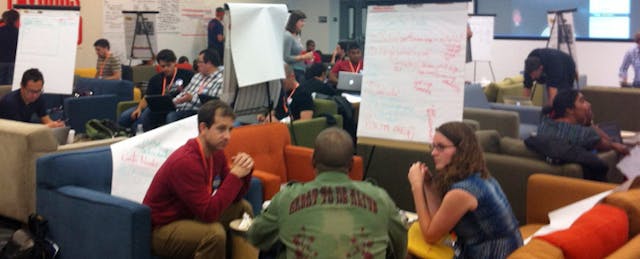"Hacking" still has a deliciously subversive undertone, a suggestion that someone is breaking the rules.
And breaking a few rules was just what managers at the Bill & Melinda Gates Foundation had in mind when they orchestrated an all-day hacking session held at Facebook's spiffy Menlo Park headquarters on Thursday (Sept. 27). The stated objective was to try to break the rules of poverty by coming up with fresh approaches to help low-income and first-generation students get into and succeed in college. But there was an even more subversive idea bubbling through the day: namely, maybe philanthropists aren't the ones who should pick the "solutions."
"The shift we've started to make is away from finding the one product or one implementation that we [the Foundation] think is best," said Stacey Childress, Deputy Director of Education, Bill & Melinda Gates Foundation, in an interview with EdSurge. Instead "we're trying to create more momentum in the marketplace so as to bring out lots of innovators, even ones that we don't know today. They, in turn, will bring their own talents."
Yesterday's hackathon marked only the opening bell for the "College Knowledge Challenge," an open call for ideas for creating social applications that can help students (especially low-income or first-generation students)--get into college, succeed and graduate. The foundation plans to award a total of $2.5 million--or approximately 30 grants between $50K to $100K apiece--to organized teams that have ideas. (Read here for more details on the grants applications, which are due November 16.)
"Technology is not a solution but a part of a set of solutions to help teachers, parents and families," Childress told the assembly.
The event at Facebook was a high profile way to draw attention to the Challenge. It seemed to work: ABC news here; NBC news there. Though there were promising, even "winning" ideas, all the conversations were deeply in brainstorming land. (Even Mike Mulligan and his steam shovel got a full day to dig their cellar.)
Childress says that the strategy of seeding the marketplace--rather than top down selection--is a new but important path for the Gates Foundation. "Rather than create a few products that might not have sustainable business models, we're hoping to get a lot into the market," she says.
Expect to see more "challenge" grants in the future--likely including a challenge around creating literacy tools for remediating and accelerating reading.
Another organization, the Shared Learning Collaborative, which also receives Gates Foundation funding, has an open call out for its "bounty program." Two open source development teams will receive $75K "bounties" for proposals to build classroom applications that use SLC technologies. (Details here.)
"There are all kinds of reasons that philanthropist like to fund a 'thing': it's tangible, concrete, you can point to it," Childress says. "It's a lot harder to create a 'context' for innovation--a more dynamic ecosystem of players," where the successful ones emerge as users choose them rather than because they're funded by a foundation.
Of course, any good "challenge" attracts more contestants than winners. Gates Foundation leaders will be part of the judging panel. But at least in the case of this "College Knowledge" challenge, judges will also include representative users (such as educators from College Summit) as well as industry leaders (Facebook executives and perhaps a venture capitalist or two).
Will $2.5 million be enough--either enough to draw great developers or to genuinely catalyze good products? During the early days of the iPod (around 2008), VC Kleiner Perkins created an "iFund" to catalyze interest in building devices that would work on the new operating system. That fund started at $100 million--and two years later, Kleiner added another $100 million.
Childress says she realizes that $100K isn't enough to fund the full development of a great product--but that it should be enough to give wings to promising ideas, which will then have to win over support from other funders. (Even Kleiner's iFund page notes that: "The iFund invests anywhere from US$100K of seed capital to US$15M of expansion capital.")
"We're proud of the 'point solutions' we've funded but now we're looking to create more momentum in the marketplace so others can come in," Childress declares."That's what challenges are all about. And this is the beginning."
Editor's note: EdSurge's funding includes support from the Gates Foundation.


